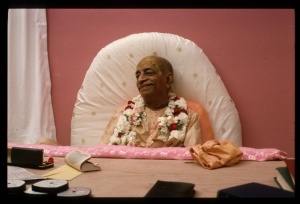SB 3.19.34: Difference between revisions
m (1 revision(s)) |
No edit summary |
||
| Line 1: | Line 1: | ||
{{info | {{info | ||
|speaker= | |speaker=Sūta Gosvāmī | ||
|listener=Sages of | |listener=Sages of Naimiṣāraṇya | ||
}} | }} | ||
[[Category:Srimad-Bhagavatam - Canto 03 Chapter 19]] | |||
[[Category:Bhagavatam Verses Spoken by Suta Gosvami - Vanisource|031934]] | |||
<div style="float:left">'''[[Srimad-Bhagavatam]] - [[SB 3|Third Canto]] - [[SB 3.19: The Killing of the Demon Hiranyaksa|Chapter 19: The Killing of the Demon Hiraṇyākṣa]]'''</div> | |||
<div style="float:right">[[File:Go-previous.png|link=SB 3.19.33]] '''[[SB 3.19.33]] - [[SB 3.19.35]]''' [[File:Go-next.png|link=SB 3.19.35]]</div> | |||
{{RandomImage}} | |||
==== TEXT 34 ==== | ==== TEXT 34 ==== | ||
<div | <div class="verse"> | ||
anyeṣāṁ puṇya-ślokānām | :anyeṣāṁ puṇya-ślokānām | ||
uddāma-yaśasāṁ satām | :uddāma-yaśasāṁ satām | ||
upaśrutya bhaven modaḥ | :upaśrutya bhaven modaḥ | ||
śrīvatsāṅkasya kiṁ punaḥ | :śrīvatsāṅkasya kiṁ punaḥ | ||
</div> | </div> | ||
| Line 16: | Line 22: | ||
==== SYNONYMS ==== | ==== SYNONYMS ==== | ||
<div | <div class="synonyms"> | ||
''anyeṣām''—of others; ''puṇya-ślokānām''—of pious reputation; ''uddāma-yaśasām''—whose fame is spread everywhere; ''satām''—of the devotees; ''upaśrutya''—by hearing; ''bhavet''—may arise; ''modaḥ''—pleasure; ''śrīvatsa-aṅkasya''—of the Lord, who bears the mark Śrīvatsa; ''kim punaḥ''—what to speak of. | |||
</div> | </div> | ||
| Line 23: | Line 29: | ||
==== TRANSLATION ==== | ==== TRANSLATION ==== | ||
<div | <div class="translation"> | ||
What to speak of hearing the pastimes of the Lord, whose chest is marked with Śrīvatsa, people may take transcendental pleasure even in hearing of the works and deeds of the devotees, whose fame is immortal. | What to speak of hearing the pastimes of the Lord, whose chest is marked with Śrīvatsa, people may take transcendental pleasure even in hearing of the works and deeds of the devotees, whose fame is immortal. | ||
</div> | </div> | ||
| Line 30: | Line 36: | ||
==== PURPORT ==== | ==== PURPORT ==== | ||
<div | <div class="purport"> | ||
Bhāgavatam literally means the pastimes of the Lord and the Lord's devotees. For example, there are pastimes of Lord Kṛṣṇa and narrations of devotees like Prahlāda, Dhruva and Mahārāja Ambarīṣa. Both pastimes pertain to the Supreme Personality of Godhead because the devotees' pastimes are in relation with Him. The Mahābhārata, for example, the history of the Pāṇḍavas and their activities, is sacred because the Pāṇḍavas had a direct relationship with the Supreme Personality of Godhead. | [[Srimad-Bhagavatam|''Bhāgavatam'']] literally means the pastimes of the Lord and the Lord's devotees. For example, there are pastimes of Lord Kṛṣṇa and narrations of devotees like Prahlāda, Dhruva and Mahārāja Ambarīṣa. Both pastimes pertain to the Supreme Personality of Godhead because the devotees' pastimes are in relation with Him. The ''Mahābhārata'', for example, the history of the Pāṇḍavas and their activities, is sacred because the Pāṇḍavas had a direct relationship with the Supreme Personality of Godhead. | ||
</div> | </div> | ||
__NOTOC__ | |||
<div style="float:right; clear:both;">[[File:Go-previous.png|link=SB 3.19.33]] '''[[SB 3.19.33]] - [[SB 3.19.35]]''' [[File:Go-next.png|link=SB 3.19.35]]</div> | |||
__NOTOC__ | |||
__NOEDITSECTION__ | |||
Revision as of 09:55, 6 May 2021

A.C. Bhaktivedanta Swami Prabhupada
TEXT 34
- anyeṣāṁ puṇya-ślokānām
- uddāma-yaśasāṁ satām
- upaśrutya bhaven modaḥ
- śrīvatsāṅkasya kiṁ punaḥ
SYNONYMS
anyeṣām—of others; puṇya-ślokānām—of pious reputation; uddāma-yaśasām—whose fame is spread everywhere; satām—of the devotees; upaśrutya—by hearing; bhavet—may arise; modaḥ—pleasure; śrīvatsa-aṅkasya—of the Lord, who bears the mark Śrīvatsa; kim punaḥ—what to speak of.
TRANSLATION
What to speak of hearing the pastimes of the Lord, whose chest is marked with Śrīvatsa, people may take transcendental pleasure even in hearing of the works and deeds of the devotees, whose fame is immortal.
PURPORT
Bhāgavatam literally means the pastimes of the Lord and the Lord's devotees. For example, there are pastimes of Lord Kṛṣṇa and narrations of devotees like Prahlāda, Dhruva and Mahārāja Ambarīṣa. Both pastimes pertain to the Supreme Personality of Godhead because the devotees' pastimes are in relation with Him. The Mahābhārata, for example, the history of the Pāṇḍavas and their activities, is sacred because the Pāṇḍavas had a direct relationship with the Supreme Personality of Godhead.